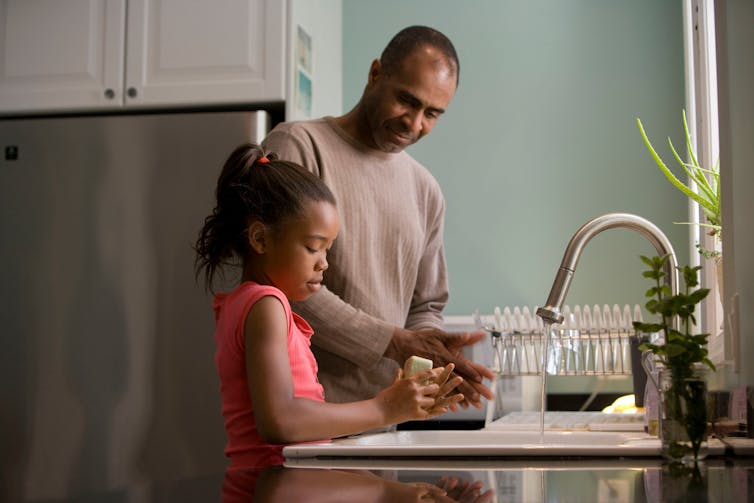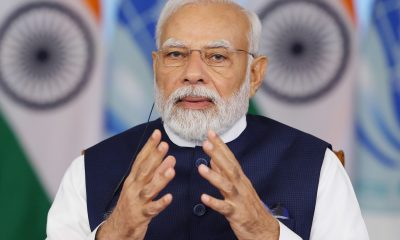Canada News
To build back better after COVID-19, we must support parents


(Ketus Subiyanto/Pexels)
The COVID-19 pandemic has exposed several failures in Canada’s social safety net: rates of anxiety, depression and substance abuse have increased dramatically, women have become disproportionately unemployed and Canadian children — whose mental and physical health ranked 30th out of 38 wealthy countries before this pandemic — are suffering even more.
Prime Minister Justin Trudeau’s plans to build back better include efforts to increase access to mental health resources and create a universal child-care system. These plans, if followed through, will undoubtedly benefit children, families and the economy. But they are missing one of the most promising and cost-effective ways to support parent and child mental health — universal parent support programs.
Parents need support, now more than ever
Parenting is a tough job. Though it comes with some of the highest highs, children’s unrelenting needs can often be relentlessly draining. Universally, children deprive their parents of sleep, deprive them economically and deprive them of alone time with their partners.


Marcos Paulo Prado/Unsplash
All of this has been exacerbated by COVID-19. The fact that many parents have had to spend more time on childcare, received less support and are experiencing greater financial stress — especially racialized Canadians, single parents, low-income parents and parents of children with disabilities — does not come without consequences.
Across the board, the mental health of both parents and children has worsened.
In many cases, it’s a reinforcing cycle. For instance, new and soon-to-be mothers in Canada are now two and a half times more likely to be anxious or depressed, which we know has significant negative impacts on children’s early neurodevelopment and long-term mental health.
Studies have also shown that COVID-19 is impairing parents’ ability to provide emotional support to their children and increasing parent-child conflict, exacerbating children’s mental health in these difficult times.
But some parents are faring better than others. Before the pandemic, parents with good social support systems, coping strategies, high self-efficiency and a strong sense of family cohesion tended to be less stressed. Through the pandemic, these same patterns have remained true: parents receiving more emotional and social support have experienced less stress and are at a lower risk of committing child abuse.
Parent support programs benefit us all
Luckily, there is a simple and effective way to extend support to parents and equip them with helpful coping strategies. Parenting support programs are psycho-education programs that help parents adjust to and manage the challenges of parenthood. They come in a variety of formats, from phone call or SMS check-ins to multi-component individual therapy, though the most common are group workshops (for example, Triple P and Incredible Years).
After participating in these programs, parents are often less stressed, depressed or anxious, more confident and more satisfied with their marriages. They also display more positive parenting and less harsh or abusive parenting styles. Their children also tend to show more pro-social behaviour, are less disruptive and exhibit less destructive antisocial behaviour.


Unsplash
This translates into many cost-saving outcomes for our society: reduced need for special education services, reduced involvement in the child welfare and criminal justice systems and reduced use of mental and physical health treatments, as wall as increased productivity and tax revenues.
In fact, for every dollar invested in these programs, returns range from 87 cents to up to $10.83, with higher benefits for those at greater risk.
Parent support programs can also be provided at a low cost. Minnesota’s Early Childhood Family Education program offers a weekly support class hosted in public schools (or currently online) to all families with children under age five. Parents who can afford it pay on a sliding scale, while those who can’t pay nothing.
What could we do better?
The Public Health Agency of Canada currently administers a parent support program called Nobody’s Perfect that’s implemented by local public health agencies across the country. Parents who participate in this program love it, and it has proven effective across many metrics, though it has not been evaluated in a randomized trial or for its cost-effectiveness. We could certainly use more research on this program.
But given the overwhelming evidence on the efficacy of parent support programs, the time to expand access is now. Although some provinces have additional programming (Ontario’s EarlyON drop-in programs and Alberta’s Family Resource Networks, for example), currently no province offers support programs to all of its parents.
In fact, there is often only selective access by urban parents who know about them. But these programs benefit all parents, regardless of ethnicity or income. They also work in-person or online. So there is no reason they should not be made equitably accessible to all.
Investing now for a better future
The mental health of parents and children in Canada was bad before the pandemic. Now it’s worse.
If we want a more productive workforce, today and tomorrow, we should invest wisely by providing universal access to proven and cost-effective parent support programs.
By helping parents build up their support networks, parenting skills and adaptive coping strategies, we will be ensuring that not only parents, but also their children, our society and our economy, will be better off throughout the COVID-19 pandemic and for decades to come.![]()
![]()
Nina Sokolovic, Doctoral Candidate, Developmental Psychology and Education, University of Toronto
This article is republished from The Conversation under a Creative Commons license. Read the original article.





















